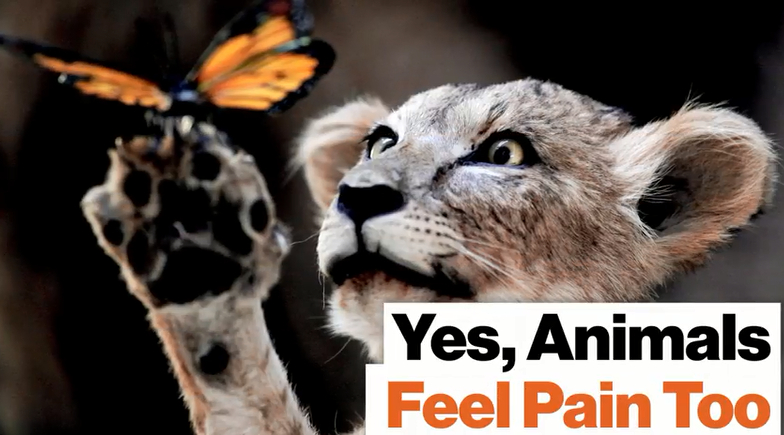(单词翻译:单击)
There’s quite a lot in Science in the Soul about the ethics of the way we treat nonhuman animals.
《灵魂中的科学》一书中讲到了很多我们对待非人类动物的道德标准
I say nonhuman because, of course, we are animals we’re not plants, we’re not fungi, we’re not bacteria, we are animals.
我说非人类,当然是因为我们是动物,我们不是植物、不是真菌,也不是细菌,我们是动物
There is a double standard in our ethics at present, which builds a wall around our own species Homo Sapiens,
现在我们有双重道德标准,这在人类物种之外竖起了一道高墙
which is rather un-evolutionary if you think about the fact that we are close cousins of chimpanzees,
如果你意识到我们是黑猩猩的近亲
if you think about the fact that we are descended from a common ancestor that lived only about six or seven million years ago.
如果你想到我们是从大约六七百万年前的同一个祖先那里进化而来的,你就会知道这堵墙有多退化
If you want to erect a moral wall around our species and say, for example, that a human embryo,
如果你想在人类周围竖起一道道德高墙,并且认为,比如人类胚胎
even a very beginning human embryo (long before it develops a nervous system) is somehow worthy of more moral consideration than an adult chimpanzee,
甚至是一个非常初期的人类胚胎(还未长出神经系统)比一只成年的黑猩猩更值得拥有道德考虑

then that is a rather un-evolutionary view point.
那么这种观点就太退化了
If you look back in our ancestry, at what point would you draw the line?
回头看看我们的祖先,你想在哪个地方画上分界线呢?
Would you give... if there were Australopithecus—almost certainly our ancestor Australopithecus three million years ago—
你会...如果有南猿人——三百万年前的南猿人肯定是我们的祖先
if you were to meet one if one had survived in the African jungle,
如果你能遇到一个,假如有一个南猿人在非洲丛林里存活了下来
would you give it the same moral consideration as the rest of us or would you say “No, no—that has the same moral consideration as a chimpanzee”?
你会像对待人类那样给他平等的道德考虑吗,或者你会说“不,不,他应该得到跟黑猩猩一样的道德考虑”?
If we look back in history a couple of centuries ago most people accepted slavery and nowadays, of course, that's a horrifying thought.
回头看看历史,几百年之前,多数人都能接受奴隶制,但现在,这种观点就很恐怖了
No civilized person today accepts slavery.
如今没有一个文明人能接受奴隶制
And if you look back further still we had the appalling things that the Romans were doing in the Colosseum with spectator sport,
如果再往前追溯一些,还有更可怕的事情,看看罗马人在罗马斗兽场里举行的大型观赏性项目
watching people killing other people, lions killing people, regarding it as fun entertainment to take the children out to.
他们欣赏人们互相残杀,狮子吃人,并将其视为娱乐活动,带着孩子一起观看
We’re certainly getting better, as Steven Pinker has said in his book The Better Angels of Our Nature,
当然我们进化了,就像史蒂芬·平克在《The Better Angels of Our Nature》一书中
and Michael Shermer in his book on The Moral Arc,
以及迈克尔·舍默在《道德之穹》一书中所说的那样
so we’re changing a lot and it’s sort of a fairly obvious thing to do to look in the future and say
我们改变了很多,未来还会继续改变
“What will our future descendants think when they look back at us the way we look back at our slave-owning ancestors with horror?
“我们会带着恐惧回头看那些支持奴隶制的祖先们,当我们的后人以同样的方式回头看我们的时候,他们会想什么?
What will our descendants look back in our time?
我们的后代回头会看到什么?
And I think the obvious candidate would be the way we treat nonhuman animals.
我觉得最有可能的一点就是我们对待非人类动物的方式
My view would be that we want to avoid suffering; therefore the criteria would be “Can this creature suffer?”
我的看法是我们想避免受苦;所以标准就变成了“这种生物会痛苦吗?”
This is the criteria that Jeremy Bentham the great moral philosopher laid out: “Can they suffer?”
这就是伟大的道德哲学家杰里米·边沁所提出的标准:“它们会痛苦吗?”
There’s every reason to think that mammals, at least and probably many more, can suffer perhaps as much as we can pain.
有充足的理由相信哺乳类动物,至少是哺乳类动物甚至还有更多,能像人感到疼那样感受到痛苦
If you think about what pain is for, biologically speaking, pain is a warning to the animal: “Don’t do that again.”
如果你说疼是什么,从生物学上来讲,疼是对动物的一种警告:“别再这么做了”
If the animal does something which results in pain, that is a kind of ritual death—it’s telling the animal,
如果动物做了会让它疼的事情,那就是一种仪式性的死亡——它告诉动物:
“if you do that again you might die and you might fail to reproduce.”
“如果你再这么做,你可能会死去,或者无法繁衍后代”
That’s why natural selection has built pain into our nervous systems, built the capacity to feel pain into our nervous systems.
所以自然选择把疼痛植进了我们的神经系统,把感受疼的能力植进了神经系统
So don’t mess around with hornets because it’s painful; don’t do that again.
所以别去惹大黄蜂,它会蜇人;别再那么干
Don’t pick up burning coals from the fire; don’t do that again.
别去火堆里捡煤块;不能再那么做
There’s absolutely no reason as far as I can see why a nonhuman animal, a dog or a chimpanzee or a cow,
考虑到疼痛的作用,我并不认为非人类的动物,一只狗、黑猩猩或者一头奶牛
should be any less capable of feeling pain than we can, when you think about what pain is actually doing.
就不如人那样拥有感受疼痛的能力
Pain feels like something primitive, feels like something like seeing color or smelling a rose or something like that.
疼痛是一种原始性的感觉,就像分辨颜色、闻闻花香之类的东西
It doesn’t feel like the kind of thing for which you need intellect.
它并不是需要智力才能拥有的东西
And actually you can go even further than that—you might say since pain is there to warn the animal not to do that again,
你甚至可以有更大胆的想法——既然疼是为了警告动物别再那么做
an animal which is a slow learner, an animal which is not particularly intelligent might actually need more intense pain
那么一个学习速度较慢、不那么聪明的动物可能需要更强烈的疼痛感
in order to deter it from doing that again than a human who is intelligent enough to learn quickly not to do that again.
以此来防止它再做同样的事情,而智力较高、很快就能学到不能再那么做的人类就不需要那么强烈的疼痛感了
So it’s even possible that nonhuman animals are capable of feeling more intense pain than we are.
所以很可能非人类的动物比我们更能感受到疼痛
I’m not sure how far I want to push that argument,
我不知道我会把这项讨论进行到多深
but I think at least I could say there’s absolutely no reasons to suppose that they feel less pain than we do and we should give them the benefit of the doubt.
但至少我能说我们毫无理由相信非人类动物不能像人类那样拥有痛感,我们应该相信它们有这种感觉


